I’ve been pretty quiet in this space lately. Now that I sit in front of this screen every day to deliver my lessons, the last thing I want to do at the end of the day is sit down and write a blog post.
And though I’ve had many ponderings during this time, I also just haven’t been inspired to share them here. I’m not usually one to get down in the dumps about things. I tend to take a pretty practical approach and when I start to despair, I’m pretty quick to realize that those heavy feelings just aren’t productive. I pull myself out of it, look for the silver lining and move forward.
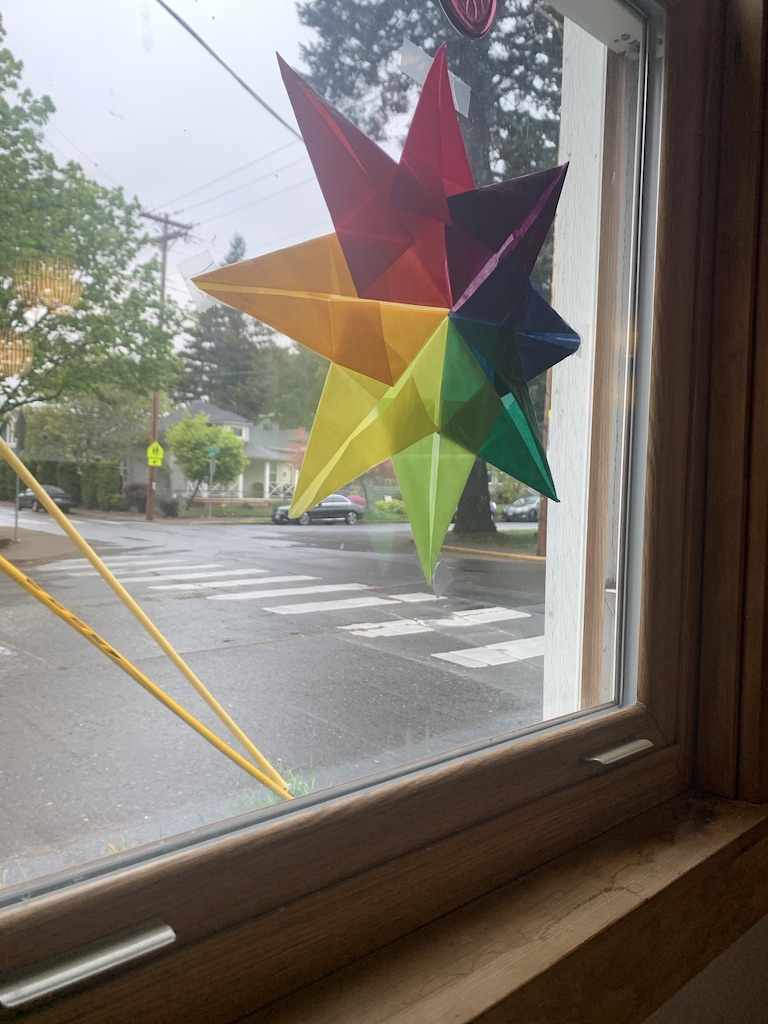
But this week I’ve just been kind of sad. Which is a little odd because it’s also the week I finally feel like I have my feet under me and I’ve found a new rhythm with this virtual teaching. But even discovering that rhythm makes me sad. I don’t want to adjust to this new normal. I just want to get back to school.
I have a weekly Zoom call with my students on Mondays and this week I could see it in their faces, too. The novelty has worn off. Their parents are doing an amazing job, but these kids need each other. The joy, pain, delight, frustration, happiness, irritation and connection that happens all in the course of a regular school day is so essential to their well-being. That is the source of the most important learning we do at school and there is no way to deliver that through Google Classroom.
But, it is what it is (here I go with the silver lining) and really, when it comes down to it, we are darn lucky. These kids are cared for, having unique experiences at home and I’m certain we’ll pick right up in September(?) without missing a beat.
Farming Block
Okay, so what have we been doing? Believe it or not, we have been in the midst of what is traditionally the most hands-on block in the Waldorf curriculum — Farming.
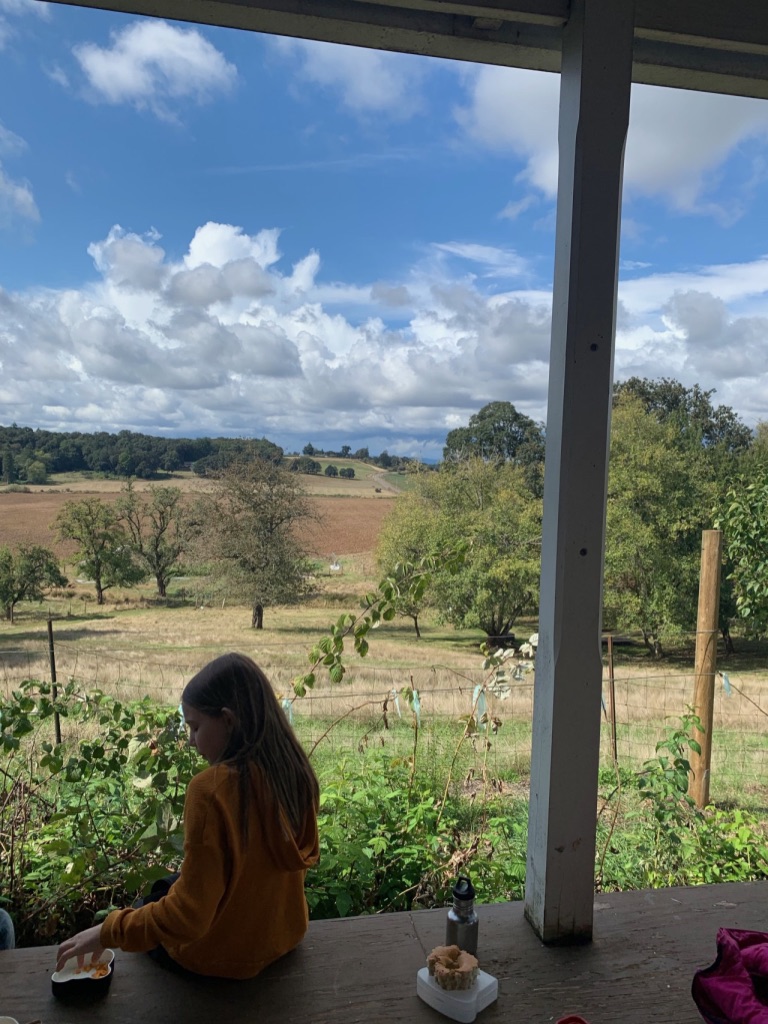
If you’ve followed my blog for any length of time, you know that I do best when I’ve got a solid structure to follow. I’m definitely one of those people who can find creative freedom only when I have a solid form to fit it into. So, when I was planning this block, I put together a format, some of which was already a regular part of our classroom routine.
During each week of this 4-week block we would study a grain and a farm animal. Starting with the grain on Monday and Tuesday, then the animal on Wednesday and Thursday. Here’s how it broke down.
- Week 1: Corn and Cows
- Week 2: Wheat and Chickens
- Week 3: Oats and Goats
- Week 4: Rice and Pigs
Review Activities
While the content of the block is certainly important, and it is the part that engages the students and captures their attention, in my view, the imaginative content should really be viewed as a medium for skill development. In some ways, this imaginative content could be anything — we just need something interesting to work with as we practice our skills.
Now, don’t get me wrong, there is tremendous wisdom in the Waldorf curriculum. There are solid developmental reasons why we study farming in 3rd grade, Greece in 5th and the Renaissance in 7th — and I agree wholeheartedly with those reasons. But the content itself is not really the point. I hold no delusions that my students are going to remember the details about this farming block years from now.
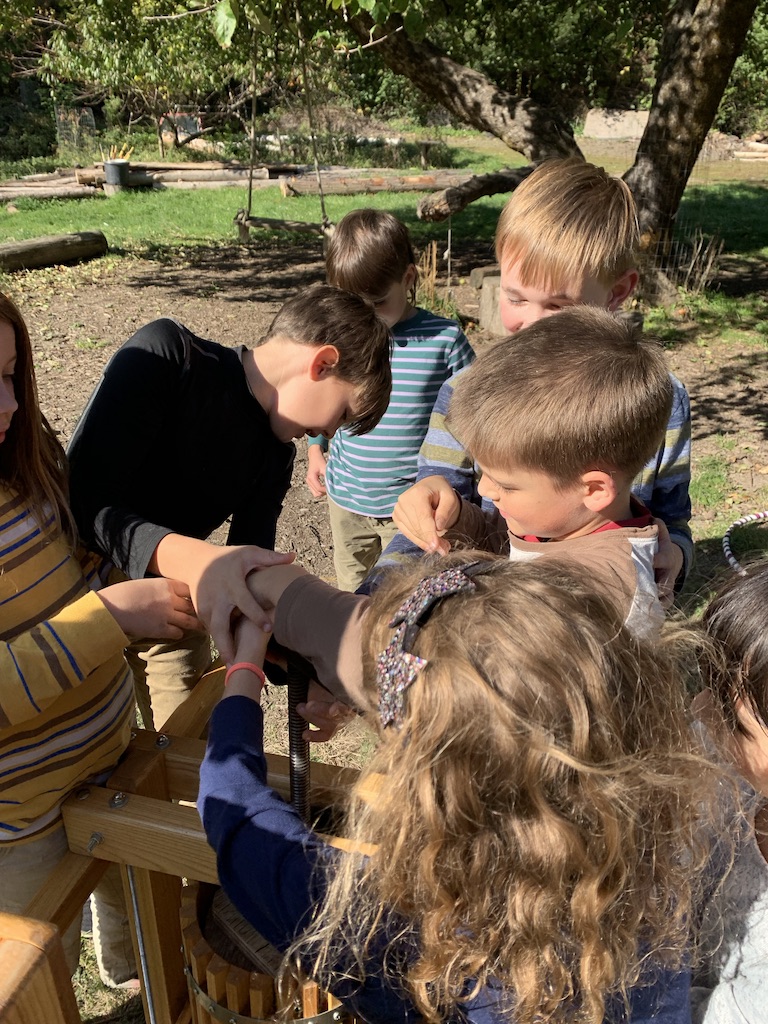
So, the work that we do with the content is paramount in my mind and, as you might guess, I have a solid rhythm around that, too. For most of my teaching career, I did not plan these review activities in this way and instead I let the work unfold somewhat naturally. I would tell the story and then decide what aspect of it seemed to resonate most with my students and then choose the review activity accordingly. Some stories lent themselves better to compositions, others to guided drawings, and we just did whatever felt right.
I think that this is still a perfectly valid way to approach the work, but there are some big benefits to having a consistent rhythm.
- A thoughtfully-planned rhythm ensures that you get around to all of those important skill-building experiences. What if one week there isn’t a story that naturally lends itself to composition? I’m sure there were plenty of weeks my students did not write. These days, it’s such an integral part of our rhythm, my 3rd graders write independently every single week.
- Knowing what you’re going to do each week allows you to arrange the content and plan accordingly. For example, Tuesday is our composition day, so I know that I have to tell a rich, imaginative story that will really stick with them on Mondays. It’s SO much harder to write when the story just didn’t hit the mark. The same thing goes for the guided drawing we do on Thursdays. Often, when I’m telling the story on Wednesday, I do my best to paint the picture with my words and gesture (this is a WHOLE lot harder to do virtually, by the way.)
Okay, so rhythm is important. Here’s our weekly rhythm for this farming block:
- Monday: Update title page with small drawing from last week’s content (light work day, heavy story day.)
- Tuesday: Composition day.
- Wednesday: Completed composition in ML books. Additional bonus review activity (this week it was a recipe.)
- Thursday: Guided drawing
- Friday: Completed weekly dictation in ML books. (Check out this blog post to learn more about my approach to dictation.)
I LOVE this rhythm and I feel so confident that it gives my students the skill-building experience they need. We have a similar rhythm for math practice and phonics practice.
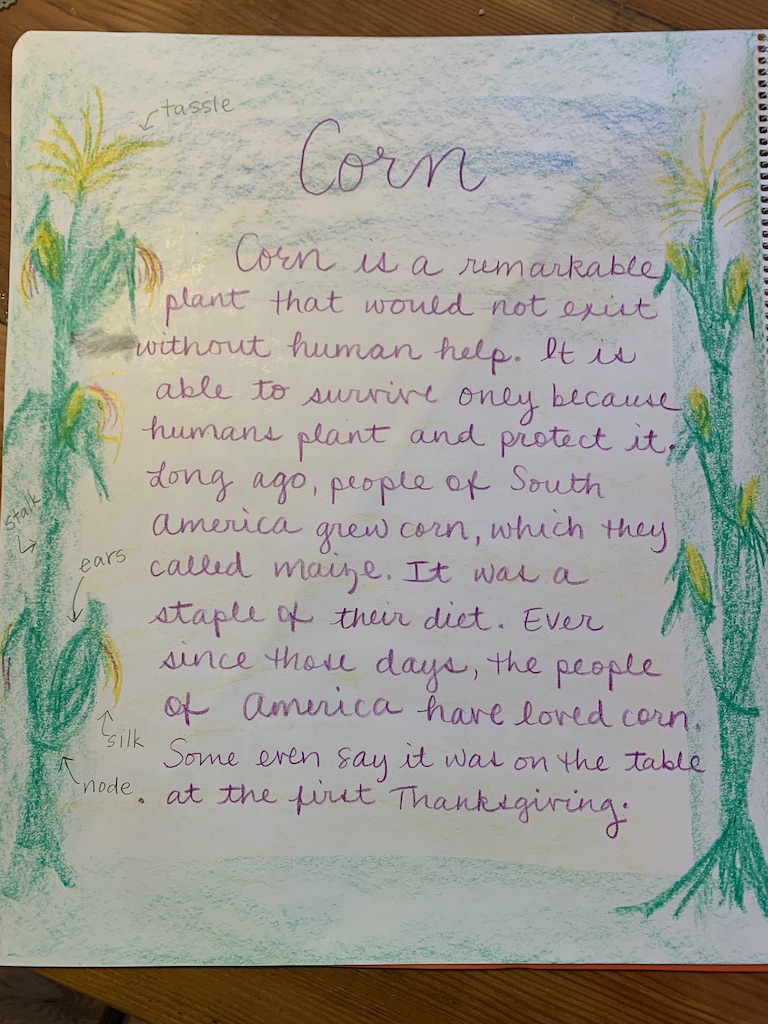
But I do want to say a word about the drawbacks of rhythm and that is that it can definitely get BORING! I try not to be a slave to the rhythm and it’s not that hard to spice things up in the classroom. I try to do this by having unique writing prompts, acting stories out before we write or letting the writing be a social experience sometimes. Though these spice-it-up activities are easy to come up with in the classroom, I am definitely struggling with it in the distance learning environment.
Distance Learning
I can’t tell you how glad I am to have this consistent rhythm worked out now that we’re doing distance learning. It’s so familiar to my students that even with everything else topsy-turvy, they know what to do. It also means that those families who are struggling to continue learning at home know when and how they can opt-in. For example, some families are doing no more than listening to Monday’s story and writing the composition on Tuesday. And honestly, if that’s what works for them, I’m in full support.
Farming Stories
Here’s a quick picture of the stories I’ve told during this block. In general, I’m providing new story content 2 days/week, Monday and Wednesday. Every now and then there is some spill-over and I’ll share something on Tuesday or Thursday. I’m recording myself telling the stories and uploading them to Google Classroom.
- Week 1: Corn — an invented story about my mother and great-grandmother on the farm in Missouri.
- Week 1: Cows — I read Blossom Comes Home from [James Herriot’s Treasury for Children.]
- Week 2: Wheat — a story about how wheat is planted, harvested and processed with focus on Cyrus McCormick’s invention of the reaper. We talked a lot about the intricacies of the wheat grain (probably too much!)
- Week 2: Chickens — There were two stories for this content. One was an interview with a class parent who keeps chickens. The other was about an egg farm.
- Week 3: Oats — Dr. Bircher Benner and the invention of Muesli.
- Week 3: Goats — A Zoom interview with [a goat farmer from Sunflower Farm Creamery]. It was an exciting day — they had a live cam and one of the mamas gave birth. They also have a YouTube channel. Check them out.
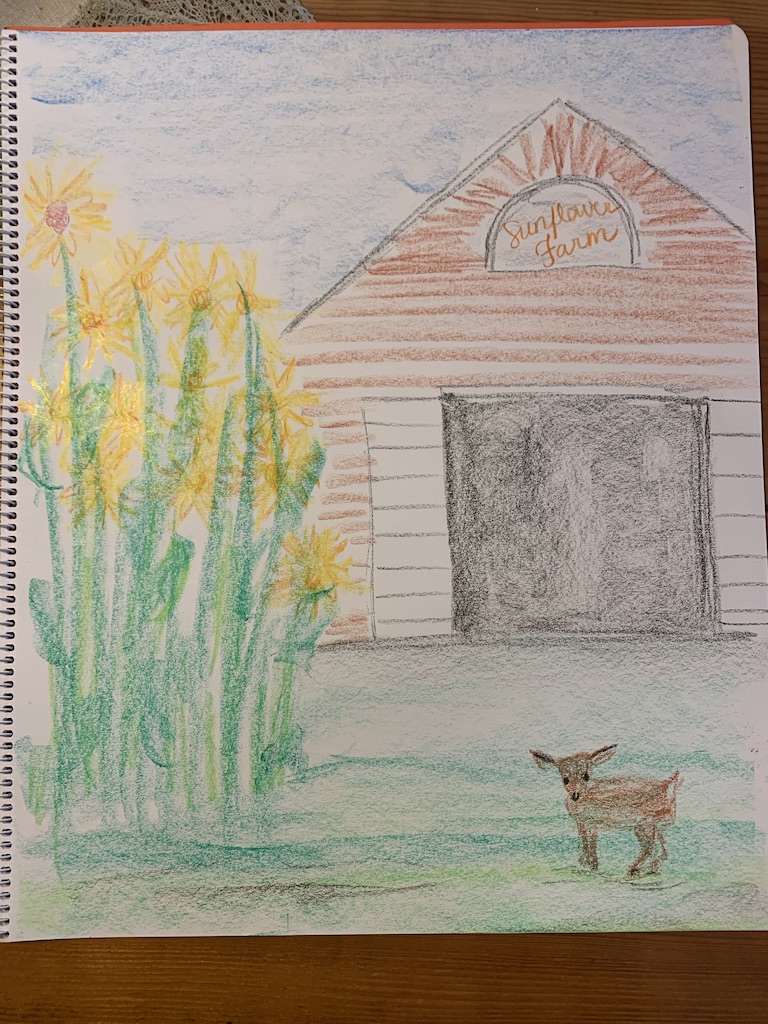
I’m still working out the details of week four, but I know it will focus on rice and pigs. I’ve got a book called One Grain of Rice, which looks pretty good. And the two interviews I did were so great, I might try to find another. (Anyone know a pig farmer?) Though I prefer to have the details of my stories worked out at the beginning of the block, at the end of the school year my summer planning has run thin and I often figure out my stories the weekend before. It sometimes feels like a scramble, but I tell myself that it keeps things fresh and interesting and it usually works out.
Next week is the last week of our farming block and then we’re moving on to a study of various professions. I’m WAY behind in my planning for this block, mostly because I’m finding it SO time-consuming to deliver my lessons virtually. I usually spend a couple of hours preparing for each main lesson, and then a couple of hours delivering it, but everything is taking twice as long with distance learning. I’m sure I’ll get faster eventually, but until then I’ll look forward to the weekends when I can get a little bit ahead.
What block are you teaching? What tips have you discovered when it comes to distance learning? When you think of it, it’s pretty inspiring that we’re all so willingly finding new and creative ways of teaching. I just wish we could connect more with our students as we did it!

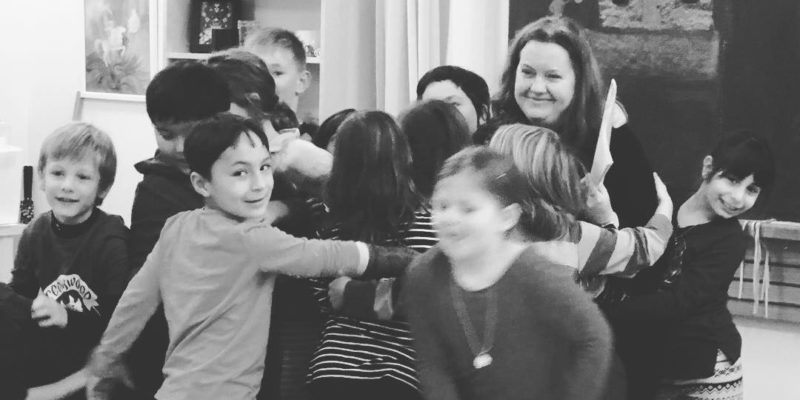

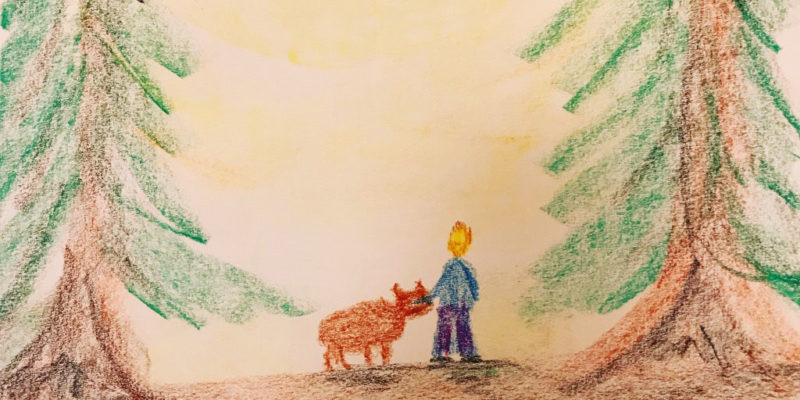
Meridith are you teaching live online main lesson or recording audios and videos.
I’m not teaching live main lesson via Zoom. We’re using Zoom for social connections as a full class. There are some small groups and individuals working with support teachers via Zoom, but for the most part all new instruction is happening in audio and video lessons that are pre-recorded.